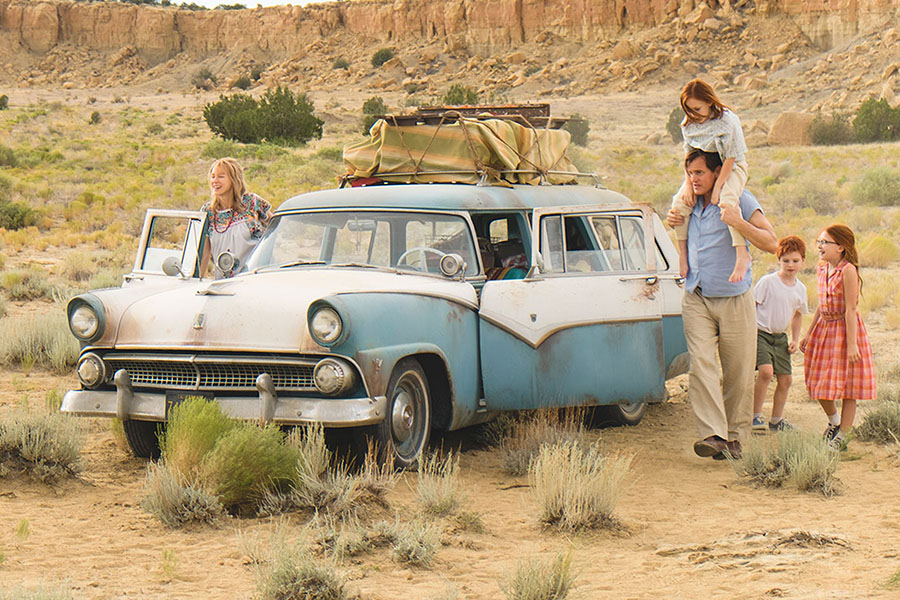Actors Shine Amid ‘The Glass Castle’ Cracks
Despite a brilliant cast, the adaptation of the best-selling memoir fails to capture the rugged hardships illustrated in the book.
PHOTO | Tribute News Service
Woody Harrelson and Naomi Watts star as the Rex and Rose Mary, respectively, the eccentric parents of the Walls children in “The Glass Castle”.
Rate:
“The Glass Castle,” directed by Destin Daniel Creeton and based off the 2005 bestseller written by Jeannette Walls, is smart in the portrayal of its characters, but repeatedly sugarcoats and omits details that make the book so heart-wrenching and authentic.
The film opens in 1989 with a surface glimpse into the life of grown-up Jeannette Walls (Brie Larson) as a gossip columnist in New York City. Her comfortable life and steady yet safe relationship with financial planner David (Max Greenfield) are immediately exposed as being starkly different from her adolescent years, which were characterized by nomadic poverty and perpetual parental neglect.
The first flashback showcases a young Jeannette (Chandler Shotwell) and her mentally ill mother, Rose Mary Walls (Naomi Watts), in one of their many nondescript stakeouts in their vagabond lifestyle. Jeannette tells her mother she is hungry, and Rose Mary, being too wrapped up in her painting session, allows Jeannette to cook hot dogs by herself. Jeannette then proceeds to accidentally catch her dress on fire and is escorted to the hospital, where she is left with lifelong burn scars.
This kind of incident is an exemplary snapshot of what the Walls children endure on a daily basis under the care of their mother and alcoholic father Rex Walls (Woody Harrelson). The sink-or-swim ideology that the parents choose to raise their children by, in both a literal and metaphorical sense, time and time again leave Jeannette and her three siblings to care and fend for themselves.
The movie proceeds in a dual fashion, hopping between Jeannette’s adult city life and her comparatively rugged and imperfect childhood. Creeton is selective in the memories that are illustrated on screen, careful to show the ones that shape Jeannette into the person she comes to be, in both good and bad realms.
The strongest parts of the film surface in Harrelson’s portrayal of the mentally unstable but boundlessly dedicated father Rex, and the dynamic of his relationship with Jeannette particularly in her early teenage years (portrayed by Ella Anderson). Harrelson’s clever acting allows the audience to see below the many eccentricities and shadows of Rex’s character to unearth a father who cares infinitely for his children and wants nothing but the best for them. Notable too is Larson’s interpretation of Jeannette, and her potent exhibition of Jeannette’s coming-of-age and acceptance of the formative events of her childhood.
Where the lead actors shine, however, the general story lags, particularly in comparison to its written counterpart. The transformative experiences that are the ultimate shapers of Jeannette’s personality are noticeably sugarcoated or left out and channel into an advocation of family as a foremost priority, in spite of any imperfections, to levels that are not considerably healthy.
There is inconsistency too in providing explanation for some of the reasoning behind the decisions and customs of the Walls family. The movie thus proves weak in its failure to allude to such tendencies that are more heavily covered in the book, and by extension tends to gloss over the presence of mental illness that drives both parents and even some of their children.
Despite its talented leading cast and applaudable creative choices, “The Glass Castle” ultimately fails to showcase the novel’s recurrent themes of the effects of mental illness on family dynamic and perceptions about situations. Creeton’s valiant effort to illustrate such a difficult story is applaudable, but proves insufficient in modeling the dysfunctional yet formidable story of the Walls family that was so expertly crafted in paperback.




